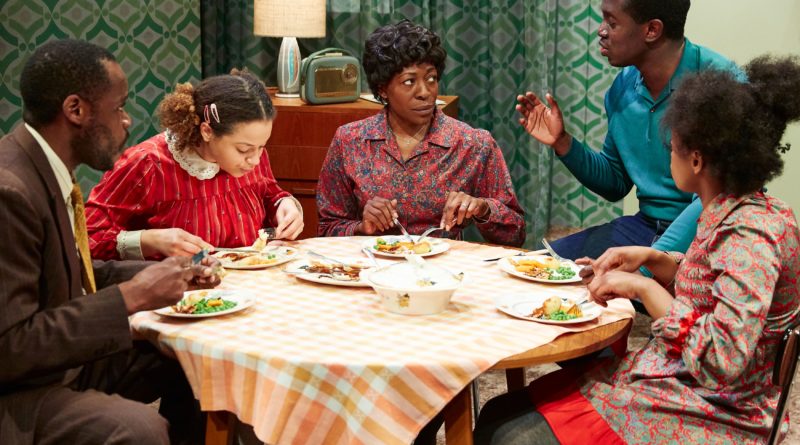Princess and the Hustler at Bristol Old Vic
Given that Bristol has a Black and mixed-race (white and Black Caribbean or African) population of around 8%, the number of Black theatre goers in city centre’s cultural spaces has always struck me as comparatively low. Historically, and as far as theatre goes, this may be to do with the fact that the community is under-represented on stage. When Black actors are cast in main roles (I’m thinking specifically here of Touching the Void), the audience appears slightly less lopsided. Programming at the Old Vic is making headway; this season has thankfully further extended its inclusivity and, last night, the stage of the Weston Studio contained a mostly Black cast; the audience reflected that.
Princess and the Hustler, a co-production between Eclipse Theatre, Hull Truck Theatre and Bristol Old Vic, deserves to be seen in Bristol, where it is set, and by as wide a selection of the community as possible because this history is everyone’s history. Set in 1963, the year of Martin Luther King’s “I Have a Dream”, Chinonyerem Odimba has written a family drama that draws to mind a 1970’s Play for Today with its simple set, mostly in the family home, and social realism. It has grit. It also has a lot of humour.
Phyllis ‘Princess’ James is an effervescent 10 year old second generation Jamaican girl who dreams of winning Miss Weston-super-Mare, a fantasy that her naivety allows and, even though she’s got the wrong hair and the wrong colour skin, the family’s white neighbour Margot has indulged her (without malice). Princess’ mother, the formidable Mavis, allows herself to be seduced now and then by the child’s enthusiasm, even though she is working her fingers to the bone to provide for her family, for Princess and for her brother, Wendell Junior, who is a photographic documenter of Bristol life. Oh how I would like to see his photos. When absentee-for-years Dad and husband, Wendell ‘The Hustler’, bangs on the door with another daughter, Lorna, in tow, the reception is understandably frosty and this situation is used to comic effect. Bitter sweet. Princess has grown up without him so the prospect of having a dad AND a sister is met with unbridled glee by her but Junior has witnessed Mavis’ suffering and Mavis herself has grown a protective shell of necessity.
The family relationship plays out against the backdrop of the Bristol Bus Boycott, when (not all) locals refused to take the bus as long as the Bristol Omnibus Company refused to hire Black and Asian crew (during the interval, I was honoured to shake hands with Roy Hackett OBE, now 90 years old, one of the founders of the West Indian Development Council who fought the ban). The Bristol Bus Boycott was important in highlighting the discrimination faced by Black citizens in Britain and its success might be seen as a catalyst for the Race Relations Acts of 1965 and 1968. A pivotal moment indeed. Meanwhile, in the James’ Bristol household, the family unites in its realisation that this foreign land to which they have been encouraged to move is rife with discrimination – where is the job that the Hustler, a war veteran, was promised? Where is Princess’ crown?
Odimba’s writing is sharp, though there is nothing illuminating here, not much that’s new. True, I know little about Bristol in the 60’s and this play has made me tap ‘Bristol Bus Boycott’ into google to find out more so I’m thankful for that. Our small Westonian group loved the references to our hometown as ‘that place of sin’ and ‘the Devil’s playground’ – hehe! The James’ family is in no way resigned to the terrible racial discrimination they face and each fights it in her own way (I can’t help feel that I’d be a little more angry about the whole injustice though but, of course, as a white woman in the Twenty First Century, I don’t really have a clue. And I never will). It must be difficult for adults to play children but Kudzai Sitima as the irrepressible Princess and Emily Burnett as the can’t-get-a-word-in-edgeways Lorna do this admirably, though Princess seems younger than her years, more eight years old than ten (if I were Lorna, I might have been tempted to slap her; she’s suitably annoying). As reality hits, as Princess understands that a Black girl will never even enter a beauty pageant in the nearby seaside town, we see her innocence pulled out from under her and we feel a mother’s pain as her little one’s dream splinters like glass. So fragile. That raw emotion is matched when the Hustler (Seun Shote) cries real tears as the boycott comes to a successful end. This cast are living their past with such feeling. Undoubtedly the best performance belongs to Donna Berlin as Mavis – she’s everything you love about a woman – strong, fallible, determined, loving, fierce – and her facial expressions are so effective that you would shrink away to nothing if you were ever on the receiving end of one of her looks of disdain. I enjoyed Jade Yourell’s turn as sassy Bristolian (accent needs a little work) Margot, who has a big heart and loves her West Indian neighbours but draws the line when it comes down to ‘jobs for our own boys’.
Simon Kenny’s Design is in keeping with the times, from the green patterned wallpaper down to the plush pink carpet and the mdf furniture. The detail is in the white-only dolls for Princess to play with, the way her pretend, cardboard crown will never rest with ease on her springy hair, the Clipper radio and the Izal loo roll (ouch! Remember that diabolical stuff?)
At the end of the show, a dozen or so members of the Bristolian community take over the stage in fabulous celebration, giving us all a feel good finale that we could have watched for at least another ten minutes (or even been a part of?). And yes, things have improved since Princess’ early years, sure, but isn’t there still a long way to go?
Princess and the Hustler plays at Bristol Old Vic until 23rd February



